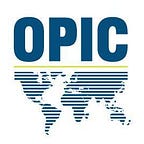Africa, Staying the Course with Good Reason
By Elizabeth Littlefield
OPIC President and CEO
Just over two years ago, President Obama hosted an historic summit of African leaders in Washington.
The event was rare in the breadth of African nations represented, but even more unusual for its buoyant consensus about the continent’s economic momentum and trajectory.
Africa was riding high. Africans knew the narrative chapter and verse, and so did major investors, ranging from Fortune 500 companies to the pacesetters of the private equity world. Africa boasted some of the fastest growing economies in the world. From 2000 to 2014, foreign direct investment into Africa had increased nearly five-fold, to $50 billion.
More important, Africa seemed finally to be moving away from, if not entirely escaping, its perennial curses: commodity dependence, corruption, devastating conflicts and fragmentation borne of colonialism.
Pessimists would point to the past two years of economic setbacks as proof that little ever truly changed in Africa.
Economic growth, yet again, plummeted along with commodity prices. Ebola devastated Liberia and Sierra Leone. Terrorist attacks in previously peaceful locales chilled tourism. Regional economic integration was welcomed in principle but elusive in reality.
Yet there is still a far stronger case today for a measured optimism than there is for despair. Here’s why.
More than a dozen African nations have taken initial steps to create sovereign wealth funds to help smooth out commodity and other economic shocks, and another 10 or so are resolved to do so.
Access to energy is increasingly recognized as crucial for economic growth, and power plants, many fueled by increasingly cheap renewable energy, are being developed from Senegal to Ethiopia. Off-grid renewable energy systems are allowing rural villages to curtail dependence on expensive diesel fuels. While such technological change is currently very small in scale, it is growing at a rapid pace.
Nations encompassing nearly 300 million people — or roughly 30 percent of Sub-Saharan Africa — have eliminated or reduced fossil fuel subsidies, which has put their government budgets on a sounder trajectory. Even as oil-dependent economies are straining under price drops, others are benefitting.
There are other reasons to be optimistic. While there has been an uptick in terrorist incidents in recent years, Africa has seen a massive drop in national and regional conflicts.
African governance, on balance, continues to become more participatory, democratic and stable and looks to continue in that direction. Contested elections with open debates about corruption are occurring. African economies, on balance, are better governed. Incumbent governments and central banks are much less likely than in the past to resort to inflationary measures in desperation.
At the grassroots level, governments have been energetic in reforming their investment climates so startups and small businesses endure a less forbidding gauntlet of red tape and petty bribes. Last year alone, five of the top 10 reformers in the world were African nations.
Eight of the 10 countries with the highest use of mobile financial services in the world are in Africa. That, in turn, has fired the drive, imagination and innovation of the young entrepreneurs who will be critical to the future.
On so many other indicators, long-term trends are in the right direction. Poverty, hunger, malnutrition and malaria levels? All down. Primary school attendance, adult literacy rates and credit to the private sector? All up.
When one speaks to African political leaders these days, they still voice commitment to market-centric economies. When one speaks with African CEOs and businessmen, they support the stabilizing effects of transparent elections and independent central banks.
Looking ahead, I see two key focal points for spurring growth. The first is sustaining the momentum for reforms. Drafting and adopting solid commercial laws and regulations to attract foreign direct investment is vital. But the hard part is mustering the political will to take decisions and investing in the technical and administrative expertise to actually implement them.
The second is inclusiveness. While great progress has been made, too few Africans are participating in the growth of the continent. African women, for example, are a large and largely untapped wellspring of dynamism. African youth are eager for more entrepreneurial opportunities.
As the head of the Overseas Private Investment Corporation, OPIC, the U.S. government’s development finance institution, I have worked in many African nations over the past few years. Most recently, I led a post-Ebola investor trip to Liberia and Sierra Leone.
I heard frustration from political and business leaders alike. I heard impatience. But it was an impatience with the pace of change, not the course of change. It was an impatience to see how fast and far Africa will rise.
Elizabeth Littlefield is the president and CEO of the Overseas Private Investment Corporation, the U.S. Government’s development finance institution.
